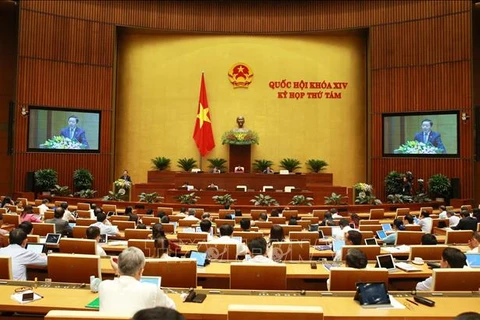 Vietnam has recorded significant achievements in managing national foreign debts over the past three decades (Illustrative photo: VNA)
Vietnam has recorded significant achievements in managing national foreign debts over the past three decades (Illustrative photo: VNA) Vo Huu Hien, Vice General Director of the Ministry of Finance’s Department of Debt Management and External Finance, made the statement, adding that the effective management has transformed Vietnam from a poor and heavily indebted country into a one receiving international organisations’ recognition as having a controlled external debt level and being excluded from the group of countries with a debt burden.
According to data from the ministry, the public sector’s proportion in the structure of the national external debt decreased from 73.6 percent in 2010 to 63.4 percent in 2015 and 43.7 percent in 2020.
The growth rate of external debt balance of the public sector has also been strictly controlled, from the average of 13 percent a year in the period of 2011-15 to about 3 percent a year in the 2016-20 period, contributing to curbing direct debt obligations and State budget provisions.
The Government’s foreign loans are mainly ODA and concessional loans (accounting for 98 per cent of the total Government external debt). To date, Vietnam has signed more than 85 billion USD worth of these loans.
As Vietnam became a low middle-income nation, all economic sectors, both public and private, are enable to access foreign loans according to market conditions.
The ministry said, in the context of limited domestic resources, foreign borrowing from all economic sectors through flexible use of capital mobilisation forms has contributed to meeting investment needs of public construction projects, encouraging domestic saving, speeding up capital turnover, and tapping potential resources of the economy to achieve socio-economic development goals and macroeconomic stability.
International organisations recommended Vietnam consider and adjust the country's foreign debt management policies and tools to better match each debt component’s risk characteristics and the country's development conditions.
A representative of the International Monetary Fund (IMF) pointed to a number of shortcomings in Vietnam's current management mechanism, including a lack of focus on risk sources and of self-insurance requirement.
Co-organised by the ministry, the IMF, and the Asian Development Bank, the workshop aimed to collect opinions for competent agencies to continue to study and complete the framework of foreign debt management policy, in accordance with the requirements for the medium and long term./.
VNA






















